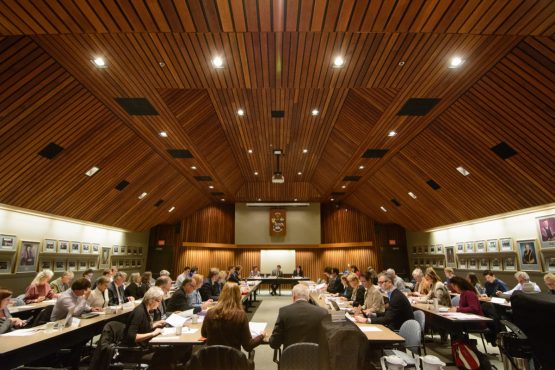The UVic Senate held their first fall semester meeting on Friday, Oct. 6, at the Senate and Board Chambers in the University Centre.
Topics addressed included new and carried proposals, elections of new members, and changes in administrative regulations by the Senate.
The meeting held Friday was a follow-up to the last meeting in May 2017 and began with Jamie Cassels’ presidential report.
The report offered a wide scope of issues, advancements, and goals that the renewed five-year strategic plan would deal with.
After a recommendation from the Advisory Panel on Federal Support for Fundamental Science to increase funding for granting councils and budgets, UVic plans to raise proper funding for “specifically targeted programs aimed at the full causeway of talent development from students through to post-doctorates, and to ensure that the next generation of young researchers are well supported” says Cassels.

A senate meeting in progress. File photo by Hugo Wong/The Martlet
Moreover, funding will be directed to Indigenous programming and Major Science Infrastructure — Ocean Networks Canada in particular will be further supported.
Cassels used a metaphor to describe how the strategic plan functions at UVic.
“It’s like planning a trip,” Cassels said, “and the strategic plan will set out where we want to go, what the highlights will be for us, what are the must-dos. ‘How are we going to get there?’ In other words, are we going to take trains, planes, or rent a car? And that’s the strategic plan: when, where, how, and why.”
Cassels also mentioned Superclusters, a federal program based in Ottawa that exists to create five or six major hubs across the country, which are led largely by industries and businesses but are supported by research affiliations like universities. These hubs will strive to accelerate improvements on pre-existing digital technology and innovate new forms of technology for the environment/clean energy, medical health, artificial intelligence, agriculture, transportation, mining, etc. UVic, UBC, SFU, Emily Carr, and BCIT are currently working on a proposal together along with Microsoft, Telus, and various companies to administer a data technology supercluster for the lower mainland.
Cassels advised Senate members not to think of the topic too narrowly.
“That supercluster would have industry involvement all the way from hard-tech firms through resource industries,” he said, “and of course into arts and culture — gaming, visualization, and so on.“
The research would, in turn, help create jobs and be a multidisciplinary advancement on campuses.
The rest of the discussion mainly consisted of checking in on current university initiatives.
The Senate spoke about the newly implemented sexualized violence prevention policy from last May. Recently hired education and prevention coordinator Leah Shumka is actively working alongside Student Affairs and the UVSS to develop, communicate, and properly integrate the new policy on campus.
Three weeks ago, the school launched the introduction of its first Indigenous Plan. Cassels emphasized the fundamental role of an educational institution to attain the goal of reconciliation with the Indigenous community.
An election among Senate was also held to appoint new student nominees to membership in January 2018, as well as the Dean of Social Sciences Catherine Krull was declared Vice-Chair elect by acclamation. A long list of university scholarships and bursaries were approved for student funding, and course curricula were managed.
Despite it being the first Senate meeting in months, only ten people, including the Martlet and two student nominees to Senate, sat in the 50 or so seats available to the public.
One way for the community to engage with the Senate and their strategic plan is to participate in Thought Exchange, an online interactive forum to raise academic issues, solutions, or ideas that need discussion among the Senate members. The forum makes it easier for the community to engage in constructive free speech in partnership with the university administration.







